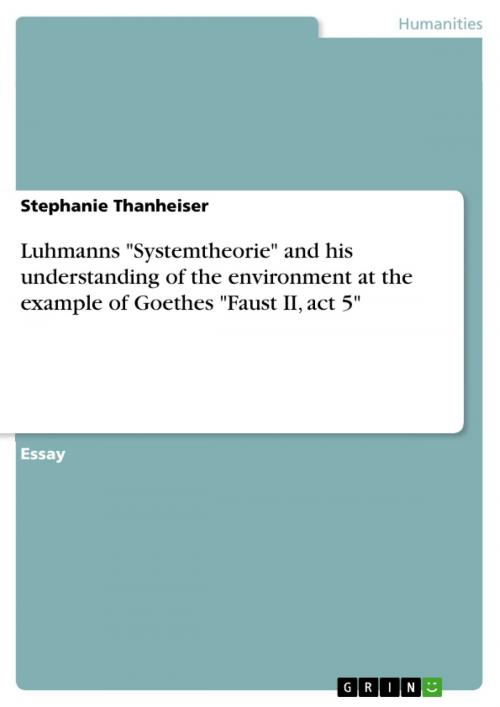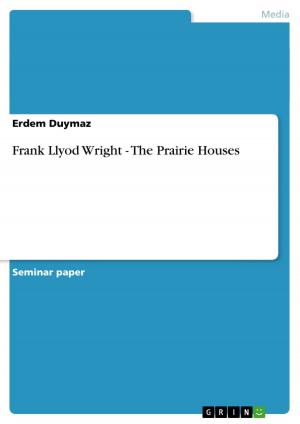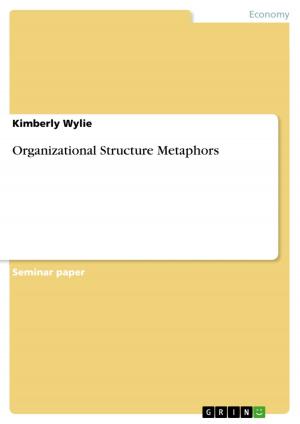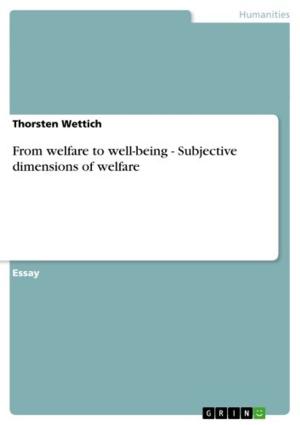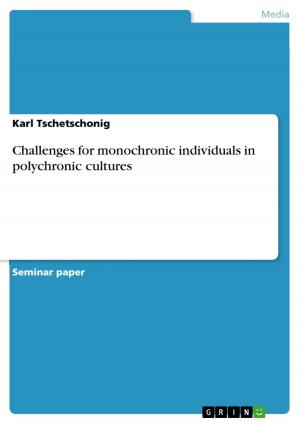Luhmanns 'Systemtheorie' and his understanding of the environment at the example of Goethes 'Faust II, act 5'
Nonfiction, Religion & Spirituality, Philosophy| Author: | Stephanie Thanheiser | ISBN: | 9783638621342 |
| Publisher: | GRIN Publishing | Publication: | March 1, 2007 |
| Imprint: | GRIN Publishing | Language: | English |
| Author: | Stephanie Thanheiser |
| ISBN: | 9783638621342 |
| Publisher: | GRIN Publishing |
| Publication: | March 1, 2007 |
| Imprint: | GRIN Publishing |
| Language: | English |
Essay from the year 2007 in the subject Philosophy - Miscellaneous, grade: 68 %, University of Westminster (University of Westminster, London), 8 entries in the bibliography, language: English, abstract: The public discussions about the ecological conditions of the social cohabit and of its relation to the social system and its environment did grow during the last 30 years. The community is affected by what they coursed in the environment. 'I write out of a sense of alarm' is what already was said and that is what describes the situation. The consumption of natural resources, the increasing dependence from self created substitutes, the reduction of the diversity of species / biodiversity as a requirement for evolution, pollution, the overpopulation of the earth is an always present subject of matter. But what could LuhmannsSystemtheoriein this context do for or against it? With the help of this theory this essay will evaluate that the environment always takes part and nothing happens without it; this is self-evident. Furthermore it will analyse that an 'absolute environment' does not exist. The view of what environment is depends on the system that is observing the environment. The environment is always changing and a main part of every evolution a system is doing. This will be illustrated on Geothes Faust II, act 5. In this peace Faust is a unsatisfied investigator who is desperate of his situation. Because of this he promises the devil Mephisto (or Mephistopheles) his soul if he could manage to take him out of his unsatisfied situation. In part II, act 5 Faust´s helpers burn down an old married couple house and a church. The couple, Philemon and Baucis, and their guest, a wanderer, died in the fire. Faust is not pleased but not angry about it as well. There old house and the church disturbed his plan to build up a new modern complex. To get land out of the sea he violates nature by building up a bank for unpropertied people. The dwellers from now on live in danger. Faust is satisfied and he died while Mephisto saying that nothing in the whole world would make any sense. Because LuhmannsSystemtheoriedemands to have a universal validity3, it must be possible to illustrate his understanding of the environment at the example of this peace of literature.
Essay from the year 2007 in the subject Philosophy - Miscellaneous, grade: 68 %, University of Westminster (University of Westminster, London), 8 entries in the bibliography, language: English, abstract: The public discussions about the ecological conditions of the social cohabit and of its relation to the social system and its environment did grow during the last 30 years. The community is affected by what they coursed in the environment. 'I write out of a sense of alarm' is what already was said and that is what describes the situation. The consumption of natural resources, the increasing dependence from self created substitutes, the reduction of the diversity of species / biodiversity as a requirement for evolution, pollution, the overpopulation of the earth is an always present subject of matter. But what could LuhmannsSystemtheoriein this context do for or against it? With the help of this theory this essay will evaluate that the environment always takes part and nothing happens without it; this is self-evident. Furthermore it will analyse that an 'absolute environment' does not exist. The view of what environment is depends on the system that is observing the environment. The environment is always changing and a main part of every evolution a system is doing. This will be illustrated on Geothes Faust II, act 5. In this peace Faust is a unsatisfied investigator who is desperate of his situation. Because of this he promises the devil Mephisto (or Mephistopheles) his soul if he could manage to take him out of his unsatisfied situation. In part II, act 5 Faust´s helpers burn down an old married couple house and a church. The couple, Philemon and Baucis, and their guest, a wanderer, died in the fire. Faust is not pleased but not angry about it as well. There old house and the church disturbed his plan to build up a new modern complex. To get land out of the sea he violates nature by building up a bank for unpropertied people. The dwellers from now on live in danger. Faust is satisfied and he died while Mephisto saying that nothing in the whole world would make any sense. Because LuhmannsSystemtheoriedemands to have a universal validity3, it must be possible to illustrate his understanding of the environment at the example of this peace of literature.
